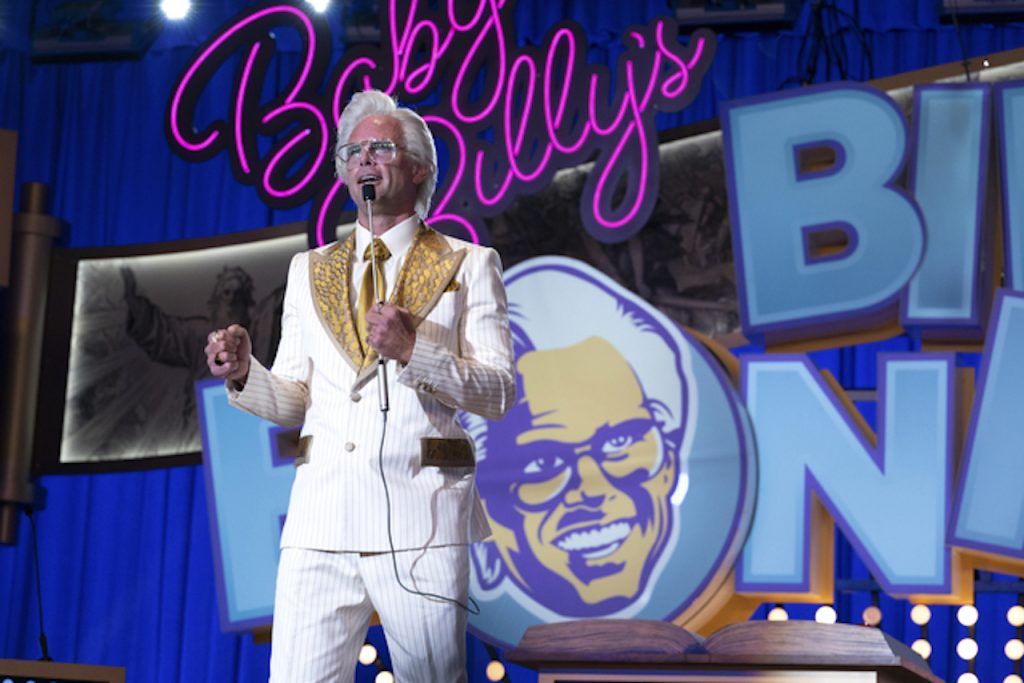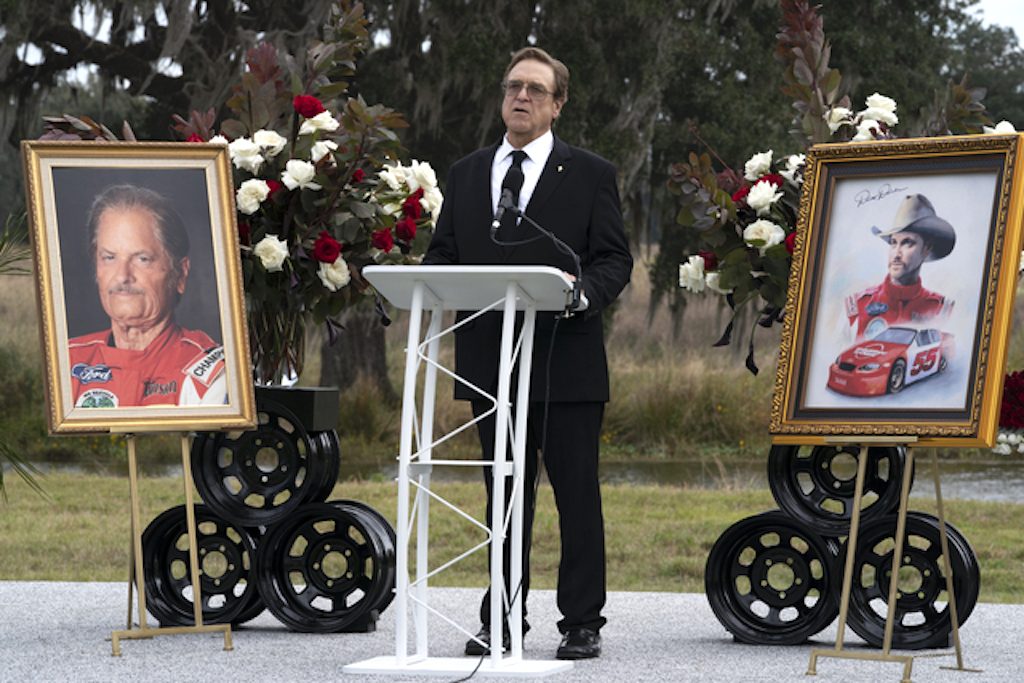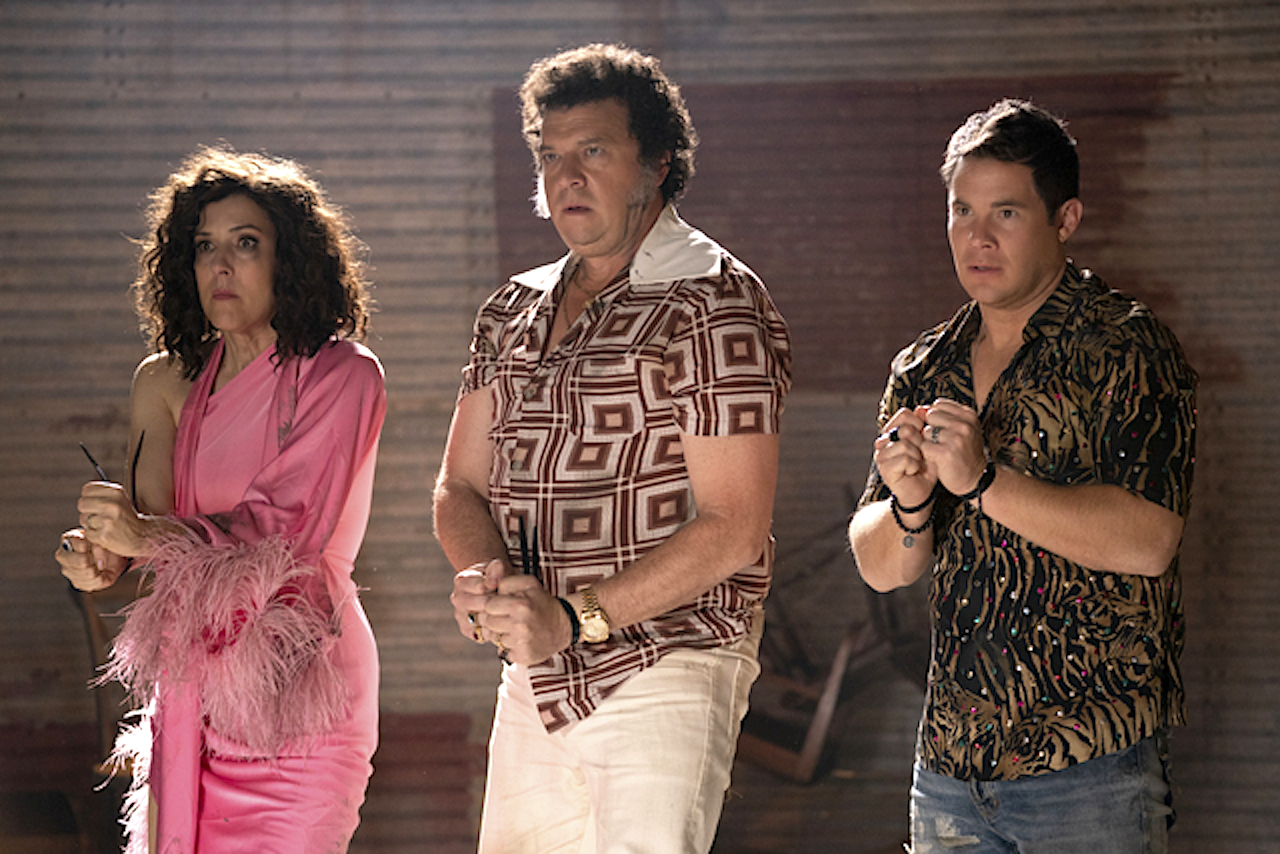The Righteous Gemstones has been described as Succession set in a for-profit Evangelical church rather than a media conglomerate. TV writer John Carcieri (Eastbound and Down, The Last O.G.) says of this claim, “I see the similarities. I understand why people make that connection. That being said, it’s a fairly boilerplate template for a TV show in terms of there being a family dynasty and a multi-generational story featuring a dysfunctional family.” Carcieri and the show’s creator Danny McBride, discussed shows like Dallas as the closest comparable TV show.
Gemstones features a deeply-flawed family that aren’t very sympathetic. That is both their blessing and their curse. The writing team took great pains not to demonize and make them caricatures that audience couldn’t connect to. In order to do this, “we always try to find humanity in these characters that may be monstrous in a lot of ways,” continues Carcieri.
Despite their profound flaws and repeated poor life choices, the Gemstones genuinely love each other as a family. “You see them bickering. You see them at each other’s throats, but always in moments of crisis, or when it matters, they’ll always circle the wagons and kind of come together as a family,” adds the writer.
Siblings Jesse (Danny McBride), Judy (Edi Patterson), and Kelvin (Adam Devine) are truly devoted to their Christian faith. Eli might be somewhat jaded. “We don’t treat their faith as a con.” Their wealth stems from the dubious prosperity doctrine and they truly believe that God is rewarding them for all their righteous deeds. “God wants you to live well. He wants you to have a good life. And if you abide by his rules and live in a way that’s pleasing to him, then he will reward you with riches.” Despite their sometimes objectionable actions, they do abide by some kind of righteous moral code.
Comedic Tone
Righteous Gemstones carries a specific understated, deadpan comedic tone. “We don’t really approach it as a regular comedy. We try to find the dramatic story at the center of the whole thing. And once we understand what that is, there are always situations that we know will be in there that are inherently funny,” elaborates Carcieri.
“A lot of the comedy and dialogue comes out after we’ve figured out what the bones of the story are. We approach that in a very serious-minded way, the way that you would plot a drama. We want to have compelling characters. We don’t want them to just be clowns to be laughed at. We want you to feel what they feel, and to understand why do they do the things they do. When you start writing only the gags, it’s easy to miss out on the character development and human qualities that they have,” he explains.
Gemstones is a serialized more than a series comedy, so there are lasting repercussions to the characters’ actions that may take several episodes to resolve. “We want to look at the ripple effects of what they do.”
All the characters are constantly moving and growing. Carcieri mentions Judy’s husband B.J. (Tim Baltz) as an example. “He’s the same character he was for the first season, but season to season, he changes, he grows, and he evolves.” The writers also apply this principle to some of the more rigid characters like Jesse and their father Eli (John Goodman) where their relationships evolve and their decisions impact the story.
That said, there are the occasional low-brow jokes that make it through. An example includes Baby Billy Freeman (Walton Goggins) who has a toilet baby. “That’s so bizarre, so silly, and it’s a gross out, but it’s also about that character being an aspirational person who wants to be more than he is, and trying to escape from the stigma of where he came from. And the same with his wife Tiffany, who’s this hillbilly who was a toilet baby herself.” When they have a toilet baby, its impact is far greater than the joke itself.

Baby Billy Freeman (Walton Goggins) Photo by Jake Giles Netter/ HBO
Similarly, there’s the “Puke-orama” gag where everyone vomits after Eli was shot in season one. “It’s wrapped up in the emotion of them being so sad about their father that they all get sick. But we executed in a way that’s purposely over the top and funny to balance some of the most onerous things in our story,” defends the writer.
Manipulating the tone is a useful device to add some levity to the darker story elements so it’s not so depressing. “We also find that when you have those dark moments, the happy times felt better because of that.” The comedy also adds to the sweetness of the show.
Meet The Gemstones
Every member of the Gemstone family is emotionally wounded as they grapple with loss, death, and grief. “A huge part of the story is the absence of their mother, Aimee-Leigh (Jennifer Nettles) following her recent death.”
“With those interlude episodes, where we go back in time and have those flashbacks in the middle of the season, we’re hoping to tell Aimee-Leigh’s story and exactly what knowledge and moral center she brought to the family.” It also raises the question of how these children come from her because they’ve strayed so far from traditional church teachings. Despite her relative righteousness, Aimee-Leigh might have to contend with her complicity in Eli’s actions.
“I think her loss is forcing people like Eli to look back and figure out what went wrong because there’s such a such a hole left without her in their family. He can’t really hide from what they become anymore,” remarks Carcieri.
The Gemstone siblings have been raised in immense wealth, so when their church starts haemorrhaging money, they feel it intensely. Eli and Aimee-Leigh built their church from scratch. “The family is somewhat entitled and they’re their big fear is that they’re going to lose it and that they don’t have what it takes to maintain and endlessly grow the church. Our story is about American capitalism as much as it’s about American religion.”
“That’s the American dream. That’s considered a noble effort. But at the same time, if that becomes too big, and you start accumulating too much wealth, it’s kind of undeniably disgusting,” declares the writer.
“I think the Gemstones really do look to God in moments of crisis in their lives. And they believe that God is on their side. God, regardless what you believe, very much exists in the show.”
The show’s creators show the existence of God in The Righteous Gemstones, often through a moment of magical realism. “These scenes can only be described as the hand of God, whether it’s the locust, the bee, or the lightning strike on Baby Billy. We try to show God’s hand sometimes come in and steers the Gemstones towards a certain path, because he has a certain plan for them.”

Eli Gemstone (John Goodman) Photo by Jake Giles Netter/ HBO
The Rhinetones see their wealth as a well-deserved reward despite their sometimes ridiculous behavior. “Maybe it’s a curse? Maybe it’s something that is not helping them as much as we may think and they’re just looking at it through the lens of worldly success? But maybe it’s not good for their souls? Maybe that’s the lesson that they’re going to learn?”
Even the most faithful churchgoers are susceptible to corruption. The Rhinestones included. During season one, they ran a Y2K scam. “Aimee-Leigh admits to Eli that she never really believed that Y2K was going to happen in a moment of guilt. The reason she allowed herself to play along with Eli’s idea is because there was something appealing to her about going back to a simpler way of life and maybe that all the kind of trappings of wealth are ruining their kids. If this were a Bible story, she would just give away all of her worldly goods and walk on that path. I think that she knows that they’re not strong enough to do that,” states Carcieri.
Inside The Writers’ Room
“We have an idea of how we want the show to end. And so, we have a few large like milestones that are carved out in the story. Other than that, we plan the show season by season. It usually starts by having a few big ideas that anchor the whole season such as wanting Eli to re-emerge and we’re going to find out he came from the wrestling world.”
“From there, we start thinking about how the other characters are influenced or impacted by that. Eli chased wealth to overcompensate for where he came from. His dad was a preacher, and in a way, he’s also trying to beat his dad. He’s also trying to please this woman who was a child star. He’s now married to and gives her the life that you think she deserves.”
“Many episodes feature an interlude that deals with the backstory. So, if we’re going to deal with Eli’s estranged sister May-May Montgomery (Kristen Johnston), we show that she has a different philosophy and follows a different version of the Christian faith than Eli. She and her husband were wronged by Eli in the past, so she has an axe to grind. We can start writing that episode right away without knowing anything else about the season.”
John Carcieri adds that they usually start writing each season with the interlude episodes because they can “write them in a vacuum” and then build out the remaining episodes around them. “Once we’re happy with the backstory, the rest of the season starts to fall into place a little bit more easily.”
To conclude, we asked John Carcieri which member of the Rhinestone family he most closely identifies with. “Probably Jesse because I think that he’s very misunderstood. He’s a bit of a thug and he’s not the sharpest pencil in the drawer. But at the same time, he has certain qualities that even Eli doesn’t have. I think Jesse is a better father than Eli. Jesse, with all of his mistakes, he seems to really care about keeping his family intact and being there for his kids. He loves his wife. He wants his marriage to work. He’s not the worst guy, even though he might have the worst presentation.”
